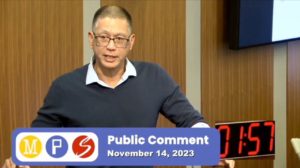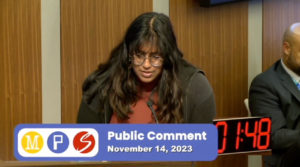“As an educator and a physician, I’m excited about new funding opportunities for Minneapolis Public Schools to transition our fossil fuel burning bus fleet to zero emission electric school buses,” Dr. Dan Trajano, MD, MBA, board member of Health Professionals for a Healthy Climate (HPHC), said during a recent Minneapolis Public Schools’ board meeting.
Just a few miles away in Edina, teen advocates representing the Edina High School Environmental Club educated Edina Public Schools’ board about the harms that outdated diesel school buses pose to their and fellow students’ health.
The buzz around electric school buses shared by HPHC members, youth, parents, and other community advocates at local school board meetings provide a glimpse into the many benefits of making the switch to electric school buses.
Sharing health concerns about diesel buses, one school board meeting at a time
For advocates like Dr. Mike Menzel, MD, co-founder of HPHC, concern for school-aged kids’ health is a primary reason for asking his community’s school district to apply for a mix of state and federal funds that can be used for securing electric school buses.
“Diesel school buses have high levels of small particulate matter, and exposure to these toxic substances are associated with cancers, cardiovascular diseases, and respiratory diseases, just to name a few,” said Dr. Menzel.
In fact, research shows that pollutants in diesel exhaust include nitrogen oxides and particulate matter that can trigger asthma attacks. Nitrogen oxides can stunt the growth of kids’ lungs.
Over a diesel bus’s 12-year lifespan of operation, just one diesel bus emits 90 tons of carbon dioxide, a climate-harming greenhouse gas. In contrast, electric school buses produce zero tailpipe emissions. When electric school buses are charged on a 100% renewable energy grid, they also produce zero greenhouse gas emissions.
But beyond the harms of diesel school buses, clean transportation advocates like Sonita van der Leeuw, transportation organizer with MN350, are excited about the health benefits of switching from outdated diesel bus fleets to cleaner electric school buses.
“This will better the health of your communities, school staff, and most importantly, students. I ask you to prioritize the health of your students,” said Sonita during testimony at a recent Minneapolis Public Schools’ board meeting.
Switching from diesel to electric buses makes sense — actual cents!
Besides climate and health benefits, switching from diesel to electric school buses also saves school districts and communities money over time.
“The real cost of electric school buses is lower than you may think. Although electric school buses have higher upfront costs today than their fossil fuel counterparts, an electric school bus can save a school district anywhere from $4,000-$11,000 annually on fuel and maintenance costs. That money can be reinvested in programs, students, and staff,” said Kathy Iverson, a retired public health specialist and HPHC member.
Currently, there’s an unprecedented opportunity to help schools offset the initial costs of purchasing electric school buses and charging infrastructure. The federal Infrastructure Investment and Jobs Act, commonly referred to as the IIJA, provides $5 billion to the Environmental Protection Agency (EPA) over five years to support the deployment of electric school buses — funds that schools can apply for. In addition, the Minnesota Department of Commerce is expected to roll out matching funds through the $13 million Electric School Bus Grant Program in 2024.
Minnesota lags behind other midwestern states, but we can take charge
Only ten electric school buses are currently on the roads across Minnesota, leaving our state sorely lagging behind in progress towards healthier futures for our kids. Nearby midwestern states, like Michigan and Illinois, have secured 138 and 124 school buses respectively, all thanks to high participation in federal funding programs that give schools rebates to make electric school buses a reality.
That’s why health professionals like Dan Trajano, Mike Menzel, and Kathy Iverson — along with numerous parents, students, and clean transportation advocates — have been spotted at local school board meetings around the state, asking their local school transportation decision makers to apply for the EPA’s Clean School Bus Rebate Program, which closes on January 31, 2024.
Help your school district take action and improve student health
Health professionals, parents, students and community members can express their support for electric school buses by meeting with their school board members or making a comment at a school board meeting, just like advocates in Edina, Minneapolis, and across our state have already done.
Let’s use our voices to start conversations with our school decision makers to get more electric school buses on the road. Because together, we can drive Minnesota towards better health for all kids, one electric school bus at a time.
The Coalition for Clean Transportation with Health Professionals for a Healthy Climate, MN350, and CURE are hosting two upcoming info sessions all about how electric school buses work, how to navigate the application processes for the different funds available, and success stories from communities that already have electric school buses. Join us!
Register for the Nov. 30 session here.
Register for the Dec. 14 session here.
Have a question about electric school buses or want to know how to start the conversation in your community? Email us at [email protected], and we’re happy to help!


